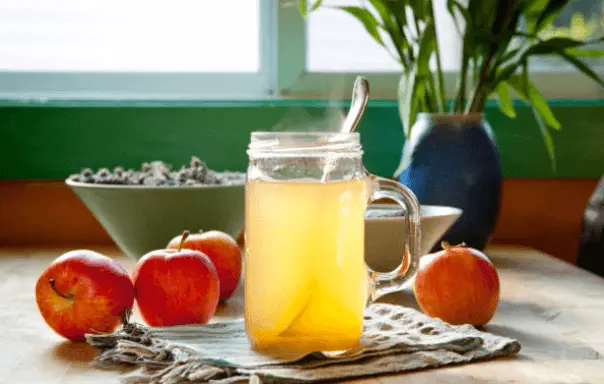Sugar-sweetened beverages (SSBs) such as fruit juices and sports drinks, according to the Centers for Disease Control and Prevention (CDC), can account for hundreds of unnecessary calories in your diet and lead to weight gain. According to the CDC, SSBs are the leading source of added sugars in the diet.
While weight gain is one of the side effects, there are even more concerning risks for conditions such as type 2 diabetes, heart disease, kidney disease, non-alcoholic liver disease, tooth decay, and cavities.
However, there are certain low-calorie drinks that can help by increasing your metabolism, stabilizing your blood sugars, and controlling cravings, among other health benefits. So, if you plan to lose weight through other lifestyle changes, these healthy drinks may become a staple in your journey.
Green Tea
For good reason, green tea is frequently associated with health. It is not only high in antioxidants and other powerful nutrients, but it is also one of the most effective weight loss drinks.
Green tea helps to reduce body weight and body fat. According to a review of 14 studies, people who drank high-concentration green tea for 12 weeks lost 0.44 to 7.7 pounds (0.2 to 3.5 kg) more than those who did not drink green tea.
This benefit is associated with green tea preparations that contain high levels of catechins, and antioxidants that may increase fat burning and metabolism.
Coffee
Coffee is consumed by people all over the world to increase energy and improve mood. This is due to the presence of caffeine, a substance that acts as a stimulant in the body and may aid in weight loss.
Coffee can help you lose weight by decreasing your energy intake and increasing your metabolism.
In one study of 33 overweight adults, those who drank coffee with 6 mg of caffeine per kilogram of body weight consumed significantly fewer total calories than those who drank less caffeine or none at all.

Caffeine consumption has also been shown in several other studies to increase metabolism and promote fat burning. Coffee drinkers may also find it easier to maintain their weight loss over time.
According to a study of over 2,600 people, those who were successful in maintaining weight loss over time drank significantly more caffeinated beverages than a control group.
Black Tea
Black Tea can also aid in weight loss. It has undergone more oxidation (air exposure) than other types of tea, resulting in a stronger flavor and darker color.
Black tea contains a lot of polyphenols, including flavonoids, which are a type of polyphenolic compound. Polyphenols are potent antioxidants that may aid in weight loss.
According to research, the polyphenols found in black tea promote weight loss by lowering calorie intake, stimulating fat breakdown, and increasing the growth of beneficial gut bacteria.
A study of 111 people found that those who drank three cups of black tea daily for three months lost more weight and had smaller waist circumference reductions than a control group.
Another study of 2,734 women discovered that those who consumed more flavonoid-rich foods and beverages, such as black tea, had significantly lower body fat and belly fat than those who consumed fewer dietary flavonoids.
Water
Increasing your water intake is one of the most straightforward ways to improve your overall health.
Drinking more water may help you lose weight by keeping you full between meals and increasing the number of calories you burn.
According to research, drinking water before meals can help you succeed when trying to cut calories and lose weight.
A 12-week study of 48 overweight adults found that those who drank 500 mL (17 ounces) of water before meals while following a low-calorie diet lost 44 percent more weight than those who did not.
Drinking cold water boosts resting energy expenditure, or the number of calories you burn while lying down. For example, a study of 21 overweight children found that drinking 10 ml of cold water per kilogram of body weight increased resting energy expenditure by up to 25% for 40 minutes.
Apple Cider Vinegar
Acetic acid, found in apple cider vinegar, is a compound that may aid in weight loss by decreasing insulin levels, improving metabolism, suppressing appetite, and burning fat.
Acetic acid has been shown in studies to prevent weight gain and reduce fat accumulation in the stomach and liver. Although research is limited, there is some evidence that vinegar can help people lose weight.

A study of 144 obese adults found that drinking a daily beverage containing 2 tablespoons (30 ml) of vinegar reduced body weight, waist circumference, and belly fat significantly more than a placebo group.
Apple cider vinegar slows stomach emptying, which helps you feel fuller for longer and may reduce overeating. It should be noted, however, that drinking acidic beverages such as apple cider vinegar can erode teeth, so it should be consumed sparingly and always followed by rinsing with water.
Protein Drinks
Protein-rich beverages can help to curb hunger, reduce appetite, and promote fullness, which is important when trying to lose weight. There are numerous protein powders available to consumers that make it simple to prepare a quick, healthy snack or meal.
Protein raises levels of hunger-suppressing hormones such as GLP-1 while decreasing ghrelin, a hormone that stimulates appetite.
In a study of 90 overweight adults, those who consumed 56 grams of whey protein daily for 23 weeks lost 5 pounds (2.3 kg) more fat than the adults who consumed the same amount of calories but without any whey protein intake.
Whey, Pea, and Hemp protein powders are just a few examples of protein powders that can add a satisfying protein boost to shakes and smoothies to help you lose weight.
Vegetable Juice
Although the consumption of fruit juice has been linked to weight gain, the consumption of vegetable juice may have the opposite effect.
Adults who drank 16 ounces of low-sodium vegetable juice while following a low-calorie diet lost significantly more weight than those who did not, according to one study.
Furthermore, the vegetable juice group increased their vegetable consumption while decreasing their carb intake, both of which are important for weight loss. To get the most fiber, it is best to consume whole vegetables whenever possible.
Consuming a low-calorie vegetable juice, on the other hand, can increase your vegetable intake and may even help you lose weight.
Psyllium husk in water
When you mix this soluble fiber with water, it turns into a liquid gel that you can add to smoothies or slurp on its own. Fiber, in general, is extremely beneficial when it comes to staying full and reducing how much you eat.
Multiple studies have found psyllium husk to be particularly effective at keeping people satisfied between meals. However, it has been shown that getting fiber from whole foods, such as oats and beans, has more beneficial health effects but still, psyllium husk in water can soothe hunger and help in weight loss.
Coconut Water
Almost nothing tastes better after a hard workout than a tall bottle of something cold and refreshing. Many sports drinks are designed to refuel athletes who engage in high-intensity exercise for an hour or more. This frequently means they contain an excessive amount of sugar, which is unnecessary for the average exercising adult trying to lose weight.

So, if you’re not training for the NYC marathon or another strenuous activity, try coconut water.
Pure coconut water is lower in sugar and contains five important electrolytes: sodium, potassium, calcium, magnesium, and phosphorus.
Cumin Tea
Cumin, the spice that gives curry its flavor, has antioxidant and anti-inflammatory properties due to an active ingredient known as thymoquinone.
If you’re feeling heavy and bloated, cumin tea may help. Cumin can also reduce blood sugar and LDL cholesterol levels, which may impair one’s ability to work out safely. While some studies support cumin as a good weight loss supplement, more research is needed to confirm its direct effectiveness.
Fennel water
Fennel water is beneficial because it relieves indigestion, which can contribute to weight gain in some cases. Fennel seeds’ antibacterial properties will help you maintain a healthy gut and process food more easily.
Despite what some health experts claim, scientists are still investigating whether fennel is an effective appetite suppressant. Regardless, if you enjoy the flavor of licorice, fennel tea could be a tasty, sweet, low-calorie treat.
Ajwain Water
Ajwain or carom seeds have been used in Ayurvedic practices to treat ulcers and indigestion, which can contribute to weight gain and bloating.
Carom seeds are said to have anti-fungal and antibacterial properties that can kill any bugs in your digestive tract. More research is needed to determine its direct effect on weight loss, but ajwain tea may have some overall positive effects on digestive health.
In Conclusion
These drinks help boost metabolism, reduce hunger, and increase satiety, all of which can aid in weight loss. Furthermore, these beverages contain beneficial nutrients such as antioxidants and other potent compounds that can improve your health.
Replacing high-calorie beverages such as soda and fruit juice with the drinks listed above is a smart way to cut calories and aid in weight loss.
